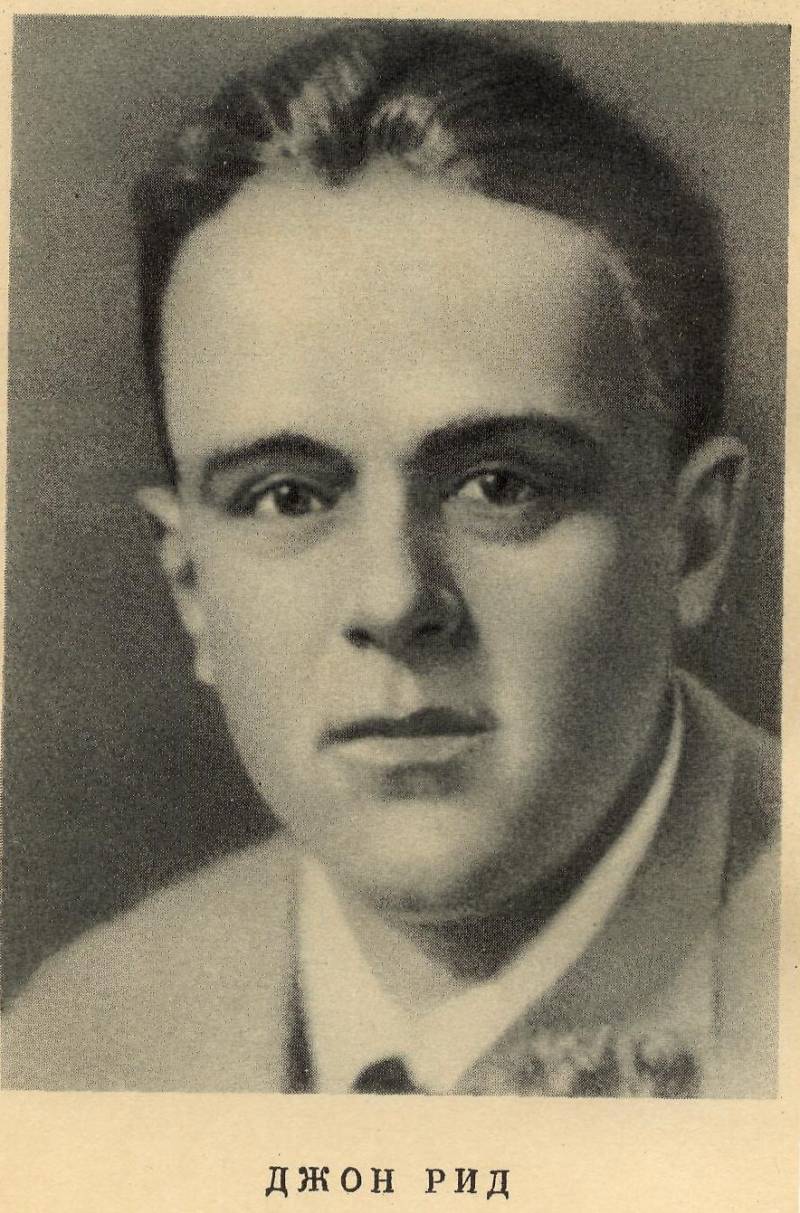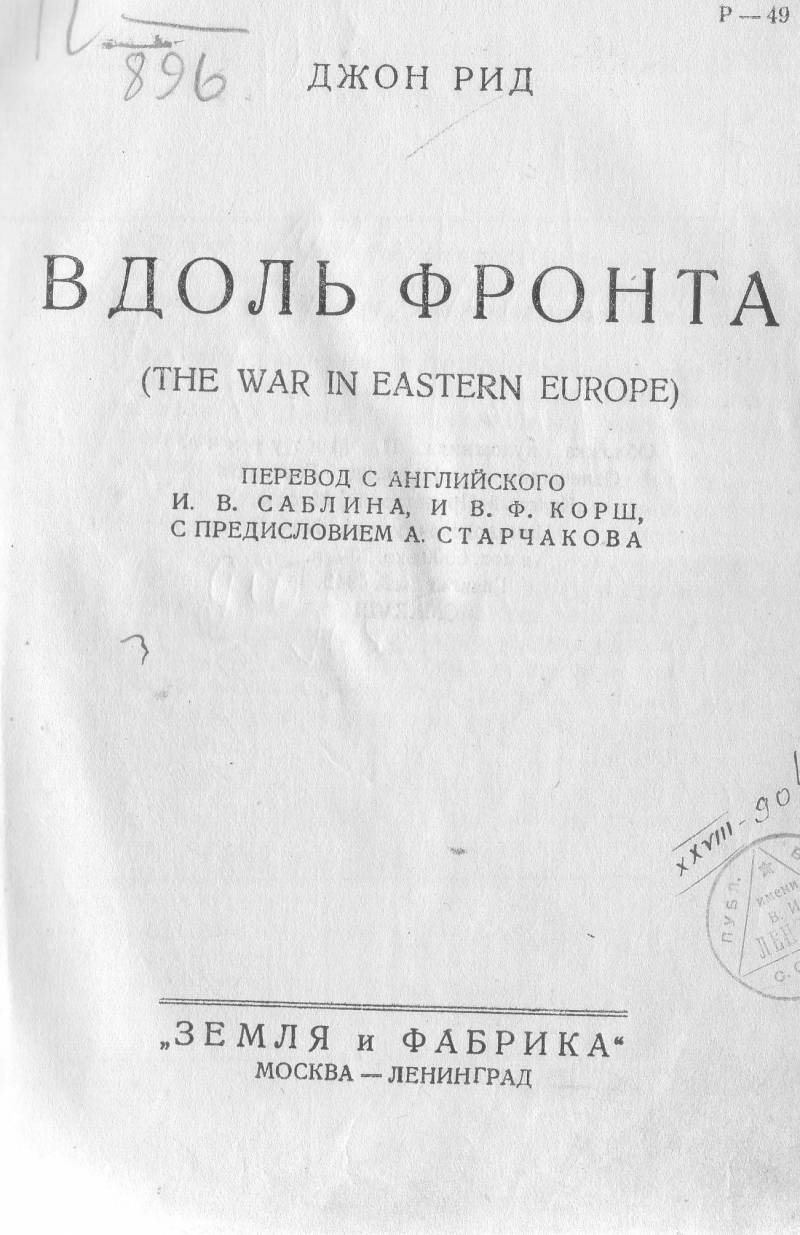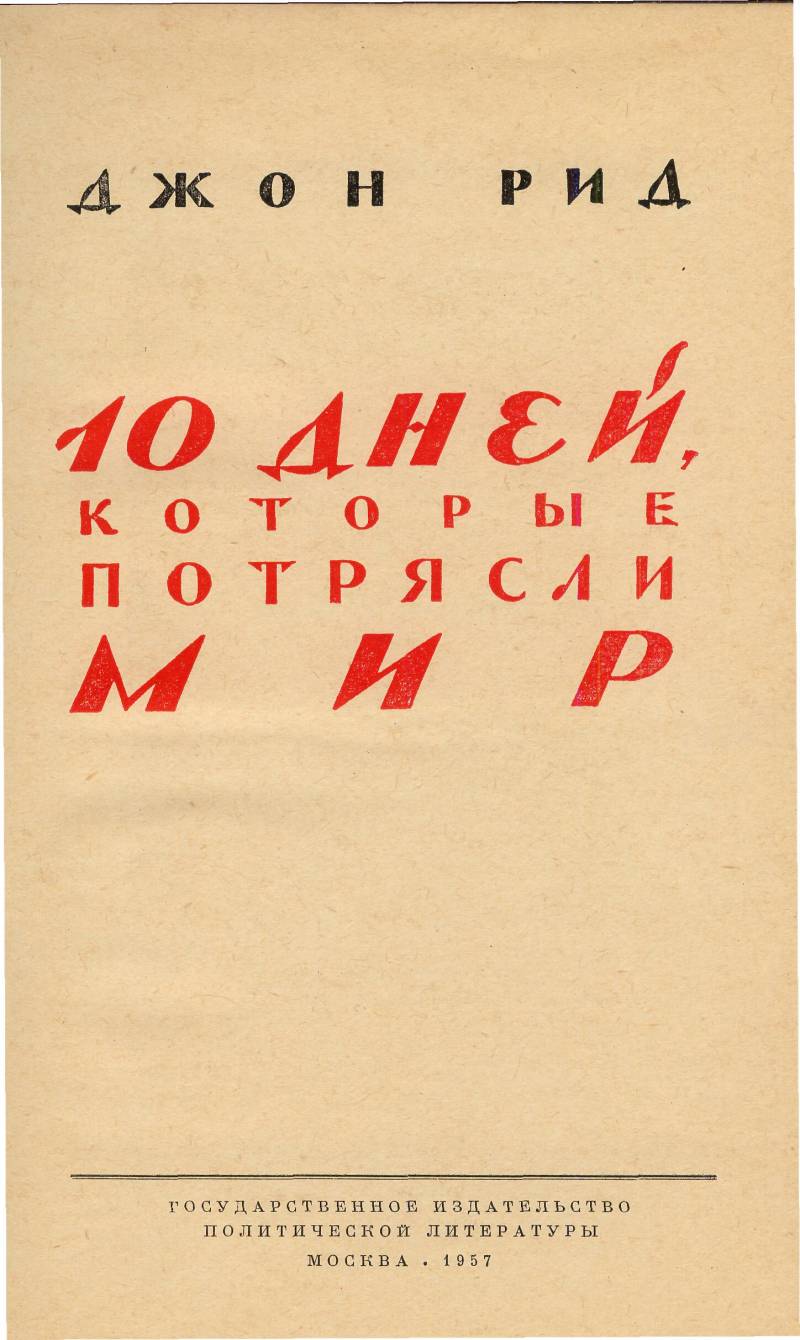American red idealist
Reed John (1887 – 1920) was an American socialist journalist, author of the well-known works Along the Front and 10 Days that Shook the World.
John Reed was born in Portland, Oregon. Mother - the daughter of a Portland entrepreneur, father - a representative of the company for the production of agricultural machinery. The journalist’s father was a “solid, upright pioneer” in the spirit of Jack London.
From his father, John inherited a first-class mind and courage. After graduating from school in 1906, he was sent to study at the most famous university in America - Harvard. After spending 4 at Harvard, John became a member of a team of swimmers, cheerleaders, was a member of the student magazine's editorial board and president of the student choir. During this period he took part in the activities of the socialist club.
John received an excellent education - he became a certified literary scholar. At the university, he carefully studied the works of socialist thinkers. And already in this period he became the author of deep publicistic articles.
After receiving his degree, John Reid went on a trip to Europe.
Deciding to become a journalist, John Reid began his career in New York. Still being the editor of the satirical university leaflet "The Mocker" showed himself to be a master in a light style. Now he writes stories, poems, dramas. Publishers began to pay him serious fees, and major newspapers ordered reviews of major events.
John Reed. Fig. "10 days that shook the world." M., 1957. From the author's library
His problem was social problems. So, when a major strike of textile workers began in Peterson - John Reed was in its midst. He participated in the Mexican Revolution in 1913 as an employee of the Metropolitan magazine. A report on this event appeared in the magazine Metropolitan, and later in the book Revolutionary Mexico.
With the beginning of the First World War, Reed went to Italy, and then to France. Reed did not sympathize with any of the participating States of the war.
Subsequently, the journalist returned to New York, remaining there until the end of 1914. In 1915, he went to Thessaloniki, then to Serbia, Bulgaria and Romania. Reed found himself in Russia, as well as in Constantinople. These events became the basis of the book "Along the Front", published in April 1916.
The title page of the book by John Reed "Along the Front." From the author's library.
In the spring of 1915 as a war correspondent, D. Reed traveled to Russia and the Balkans, making the 2 th trip to European theaters.
John Reed got to Eastern Europe at a time when the German command, concentrating powerful shock forces on the Eastern Front, was trying to take Russia out of the war with a powerful blow. At the same time, a lull on the Western Front, bought by the blood of a Russian soldier, enabled the Allies to prepare for new decisive battles.
Desperate adventure almost cost the life of a correspondent. Supplied with dubious documents, he arbitrarily crossed the river. Prut and penetrated into the location of the Russian army. Only a happy confluence of circumstances saved John Read from being shot on suspicion of espionage.
The author of this book tried to remain as an objective and bona fide chronicler. John Reed tries impassively to reproduce all that he witnessed. The style of the correspondent record caused a certain superficiality of the presentation.
The author noted that the Russian capitalists, the petty bourgeoisie and the proletariat were “very patriotic”, because the paradox of the war was that the struggle against the Germans was at the same time a struggle against the Russian bureaucracy.
He was particularly struck by the many faces and national diversity of Russia.
Soon D. Reed returned to the United States. But even after 1917’s entry into his world war in April, the journalist’s position on the latter remained unchanged.
John Reed was a born war correspondent. The danger could not hold him - he always made his way to the front. An eyewitness recalled how a journalist in September 1917 on the Riga front near Wenden, when the German artillery bombarded the nearby village with shells, almost died - but was delighted.
During his travels, John Reid sought to get to the root of the identified problems, emphasizing their social overtones. So it was in the study of Mexican problems during social conflicts in Peterson and Colorado. Returning from the latter, he told about the massacre in Ludlo - how miners were thrown out of their homes, and the soldiers were shot to flee the workers. And, addressing Rockefeller, he said: “These are your mines, these are your hired bandits and soldiers. You are killers! ”
As a result, John Reed was brought to justice - but for anti-militarist articles. This became possible after the transformation of the USA into a belligerent state.
By this time, Reed returned from the battlefields of the First World War with curses as a social phenomenon - like a bloodbath. In the magazine "Liberator" John Reid published a fierce article - and, together with other editors, was tried for treason. The prosecutor of New York tried his best to get a conviction from the jury. Reed and his comrades defended their convictions, and John said that he would not even fight under the American flag — by painting pictures that he had become an eyewitness to. And ... the editors were acquitted.
In the summer of 1917, Mr. Reed hurried to Russia, which was in a revolutionary frenzy.
John Reed was an active participant in the October events in Petrograd, as an eyewitness to the dissolution of the Pre-Parliament, the construction of barricades and the applause of V. I. Lenin and G. E. Zinoviev, when they emerged from the underground after the fall of the Winter Palace.
He told about all these events in his famous book Ten Days That Shook the World. The book was published in the USA in 1919 (sustaining only the 3 edition this year) and first published in Russian in the USSR in 1923. The work was highly appreciated by V. I. Lenin in the preface to the American edition. During the second visit of John Reed to Soviet Russia in 1919, V. I. Lenin wrote a preface for a new American edition of the book — but with a preface by V. I. Lenin, it was published in the US only in 1928.
Title page of John Reed's 10 Days That Shook the World. From the author's library.
V.I. Lenin noted the tremendous interest in D. Reed’s book, recommended it to workers of all countries, wanting to see translated into all languages - after all, she “gives a truthful and unusually lively written account of events so important for understanding what a proletarian revolution is, what is the dictatorship of the proletariat. "
NK Krupskaya also wrote that in this book “the first days of the October revolution are unusually vividly and strongly described. This is not a simple list of facts, a collection of documents, it is a series of living scenes so typical that each of the revolutionists should recall the similar scenes he witnessed. ”
John Reed’s book before 1957 was published in Russian 11 times: in 1923, in 1924 (4 editions), in 1925, in 1927 (2 editions), in 1928, 1929 and 1930. Almost all editions of the book in Russian, starting with the first, were published with prefaces by V. I. Lenin and N. K. Krupskaya.
Reed picked up material for the book everywhere — for example, he collected complete sets of newspapers Pravda, Izvestia, all brochures, proclamations, posters, and posters.
The fact that the journalist was in control of the situation is shown by the following fact.
The Central Committee of the RSDLP (b) 10 of October 1917 adopted a resolution written by V.I. Lenin on the current moment, recognizing the uprising as inevitable and ripe and proposing to all organizations of the party to be guided by this postulate in their practical activities. L. B. Kamenev and G. E. Zinoviev voted against this resolution, and L. D. Trotsky suggested not starting an uprising before the opening of the Second Congress of Soviets. John Reed particularly emphasized the position of Leonid D. Trotsky at the congress.
John Reed noted that the strength of V.I. Lenin as the leader of the Bolshevik revolution was that it combined intellectual-theoretical power with organizational genius. D. Reed called V.I. Lenin an "extraordinary leader." V.I. Lenin possessed, as John Reed wrote, "a powerful ability to uncover complex ideas in the simplest words and give a deep analysis of the concrete situation with a combination of insightful flexibility and daring courage of the mind."
The author of the book was inspired by the ideas of the Bolshevik Party, and after returning from Russia, attempts were made in the United States to confiscate materials collected by John Reed - including through gangster attacks to steal a book from the publishing house.
After the publication of the Ten Days, the American magazines did not publish a single line of it, and the journalist actually created his own journal — became the editor of the Revolutionary Century magazine, and then the Kommunist magazine. Reed promoted his views, driving around America and participating in conferences, and finally became one of the founders of the Communist Workers Party.
D. Reed fought against the American intervention in Soviet Russia - and in this connection 5 was brought to justice once and 20 was arrested once.
It was Russia that turned John Reed into a consistent revolutionary. The journalist’s writing desk was littered with books by K. Marx, F. Engels and V. I. Lenin. And John Reed became an adept of the Russian revolution.
As a result, in 1919, Mr. Reed arrived in Moscow and began working at the Communist International to merge the two US Communist parties, and was elected a member of the Executive Committee of the Comintern.
In July-August 1920, he became a delegate to the 2-th Congress of the Comintern. He traveled a lot around Russia, collecting material for a new, third, book - about the everyday life of peaceful construction.
In the fall of 1920, returning from the Congress of the Peoples of the East, he fell ill with typhus and on the night of October 19, 1920 died in Moscow.
The remains of John Reed buried in Red Square, near the Kremlin wall.
Sources of
Reed John. Along the front. M., 1916.
Reed John. 10 days that shook the world. M., 1957.
Literature
Reed John. 3 ed. M .: Soviet Encyclopedia, 1969.
Kireeva I.V. Literary works of John Read. Bitter, 1974.
Dangulov A.S., Dangulov S.A. Legendary John Reed. M .: Soviet Russia, 1978.



Information